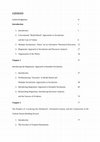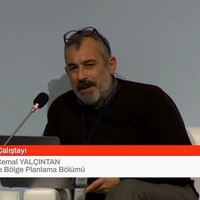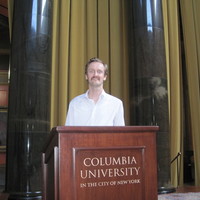Papers by erdem damar
Critical Sociology, Feb 28, 2023
Journal of Contemporary European Studies, 2016
This article suggests that the Gezi Park protests in general, and particularly the presence there... more This article suggests that the Gezi Park protests in general, and particularly the presence there of the anti-capitalist Muslims is a valuable example for studying the ambiguity and complexity of the secular/islamic paradigm in Turkey. conducting field research on the formation of the anti-capitalist Muslim identity, i argue that the secular/islamic divide is politically produced, and potentially vulnerable to contestations and transformations, for it opens the socio-political landscape to the production of multiple secularisation projects beyond this divide.
This article suggests that the Gezi Park protests in general, and particularly the presence there... more This article suggests that the Gezi Park protests in general, and particularly the presence there of the Anti-Capitalist Muslims is a valuable example for studying the ambiguity and complexity of the secular/Islamic paradigm in Turkey. Conducting field research on the formation of the Anti-Capitalist Muslim identity, I argue that the secular/Islamic divide is politically produced, and potentially vulnerable to contestations and transformations, for it opens the socio-political landscape to the production of multiple secularisation projects beyond this divide.

PhD. Thesis conducted at the University of Essex, 2012
"
Although Kemalist secularism is often considered as a distinctively unique secularization proj... more "
Although Kemalist secularism is often considered as a distinctively unique secularization project, dominant approaches have the tendency of reducing it either to an imitation of idealized West-oriented secularism models, or to a necessary product of specific historical conditions of the Ottoman-Turkish context. This thesis questions these dominant tendencies for they run the risk of disregarding the creative and original interventions of the Kemalist elite through which a distinctively unique conception of secularism, secular identity, and secular subjectivity is formed in Turkey. This thesis suggests that without studying the ideological and subjectivity dimensions, the specificity and complexity of Kemalist secularism cannot be explored adequately. Accordingly, it argues that Kemalist secularism is a distinctively unique modality of secularism because it came into existence in and through the operationalization of a peculiar ideological force, which I call the Orientalist fantasy. Chapter 1 introduces the poststructuralist hegemonic approach and poststructuralist discourse analysis that I employed in this thesis to study what I call the hegemonic formation and operationalization of Kemalist secularism. Drawing on the discourses of the first generation Kemalist elites with special reference to the enactment of the Hat Law in the early Republican era (1923-1938), chapter 2 discusses what is meant by the Orientalist fantasy, and the historical conditions of its emergence. Drawing on the Kemalist secularist discourses on the so-called ‘new veiling question’, chapter 3 discusses the operational force and main characteristics of the Orientalist fantasy in post1990s Turkey. By introducing the categories of emotional affiliation and structures of feeling, chapters 4 and 5 discuss the endurance of the Orientalist fantasy. Drawing on the Kemalist secularist discourses on the so-called the February 28th (1997) ‘postmodern coup’ in chapter 4, and on the rise of the ‘new Islamic’ Justice and Development Party government in chapter 5, I introduce harassment and fear as two central structures of feeling that endure the Orientalist fantasy. The concluding chapter summarizes the main arguments of the thesis, incorporates the normative and ideological implications of the analysis, explicates the advances of the poststructuralist approach over dominant approaches in studying the Turkish experience with secularism, and introduces sorts of research questions the thesis opens up for future research.
"

Dilemmas of Democracy in the Middle East: Cases from Turkey, Jordan, and Israel, 2010
How does every confrontation of the Kemalist state discourse with Islamic-oriented political disc... more How does every confrontation of the Kemalist state discourse with Islamic-oriented political discourses end up with the triumph of the former over the latter? The object of this paper is to analyze the way in which the hegemonic coordinates of the secular Kemalist state discourse is reconfigured in its confrontation with the Islamic-oriented political discourses in the light of a recent significant political event in Turkey which has been known as the February 28th (1997) ‘post-modern coup.’ We will argue that, the sentiment of ‘being harassed by the Islamic other’ has central constitutive role in energizing the mobilizations of the mainstream populace against the Islamic-oriented discourses through which the hegemony of the secular Kemalist state discourse is reiterated. Throughout our discussion on the February 28th process, we will introduce ‘demonization’ as the main logic characterizing the secular Kemalist engagement with the ‘Islamic other’ through the stimulation of the sentiment of ‘being harassed’. We will conclude with briefly trying to open up a possibility through which a critical engagement with the democratic regime in post-February 28th Turkey might merge.
Radikal, May 21, 2010
gibi günlük hayatın her değeri demokratik siyasette kullanılır; önemli olan kullanımın şeklidir. ... more gibi günlük hayatın her değeri demokratik siyasette kullanılır; önemli olan kullanımın şeklidir. Görünen şu: Hem laik-cumhuriyetçi hem de İslami-muhafazakâr kesim bu değerleri kendi değerler sisteminin ötesinde yaşayan kesimi sindirici bir kin dürtüsüyle kullanıyor"
Conference Presentations by erdem damar











Uploads
Papers by erdem damar
Although Kemalist secularism is often considered as a distinctively unique secularization project, dominant approaches have the tendency of reducing it either to an imitation of idealized West-oriented secularism models, or to a necessary product of specific historical conditions of the Ottoman-Turkish context. This thesis questions these dominant tendencies for they run the risk of disregarding the creative and original interventions of the Kemalist elite through which a distinctively unique conception of secularism, secular identity, and secular subjectivity is formed in Turkey. This thesis suggests that without studying the ideological and subjectivity dimensions, the specificity and complexity of Kemalist secularism cannot be explored adequately. Accordingly, it argues that Kemalist secularism is a distinctively unique modality of secularism because it came into existence in and through the operationalization of a peculiar ideological force, which I call the Orientalist fantasy. Chapter 1 introduces the poststructuralist hegemonic approach and poststructuralist discourse analysis that I employed in this thesis to study what I call the hegemonic formation and operationalization of Kemalist secularism. Drawing on the discourses of the first generation Kemalist elites with special reference to the enactment of the Hat Law in the early Republican era (1923-1938), chapter 2 discusses what is meant by the Orientalist fantasy, and the historical conditions of its emergence. Drawing on the Kemalist secularist discourses on the so-called ‘new veiling question’, chapter 3 discusses the operational force and main characteristics of the Orientalist fantasy in post1990s Turkey. By introducing the categories of emotional affiliation and structures of feeling, chapters 4 and 5 discuss the endurance of the Orientalist fantasy. Drawing on the Kemalist secularist discourses on the so-called the February 28th (1997) ‘postmodern coup’ in chapter 4, and on the rise of the ‘new Islamic’ Justice and Development Party government in chapter 5, I introduce harassment and fear as two central structures of feeling that endure the Orientalist fantasy. The concluding chapter summarizes the main arguments of the thesis, incorporates the normative and ideological implications of the analysis, explicates the advances of the poststructuralist approach over dominant approaches in studying the Turkish experience with secularism, and introduces sorts of research questions the thesis opens up for future research.
"
Conference Presentations by erdem damar
Although Kemalist secularism is often considered as a distinctively unique secularization project, dominant approaches have the tendency of reducing it either to an imitation of idealized West-oriented secularism models, or to a necessary product of specific historical conditions of the Ottoman-Turkish context. This thesis questions these dominant tendencies for they run the risk of disregarding the creative and original interventions of the Kemalist elite through which a distinctively unique conception of secularism, secular identity, and secular subjectivity is formed in Turkey. This thesis suggests that without studying the ideological and subjectivity dimensions, the specificity and complexity of Kemalist secularism cannot be explored adequately. Accordingly, it argues that Kemalist secularism is a distinctively unique modality of secularism because it came into existence in and through the operationalization of a peculiar ideological force, which I call the Orientalist fantasy. Chapter 1 introduces the poststructuralist hegemonic approach and poststructuralist discourse analysis that I employed in this thesis to study what I call the hegemonic formation and operationalization of Kemalist secularism. Drawing on the discourses of the first generation Kemalist elites with special reference to the enactment of the Hat Law in the early Republican era (1923-1938), chapter 2 discusses what is meant by the Orientalist fantasy, and the historical conditions of its emergence. Drawing on the Kemalist secularist discourses on the so-called ‘new veiling question’, chapter 3 discusses the operational force and main characteristics of the Orientalist fantasy in post1990s Turkey. By introducing the categories of emotional affiliation and structures of feeling, chapters 4 and 5 discuss the endurance of the Orientalist fantasy. Drawing on the Kemalist secularist discourses on the so-called the February 28th (1997) ‘postmodern coup’ in chapter 4, and on the rise of the ‘new Islamic’ Justice and Development Party government in chapter 5, I introduce harassment and fear as two central structures of feeling that endure the Orientalist fantasy. The concluding chapter summarizes the main arguments of the thesis, incorporates the normative and ideological implications of the analysis, explicates the advances of the poststructuralist approach over dominant approaches in studying the Turkish experience with secularism, and introduces sorts of research questions the thesis opens up for future research.
"